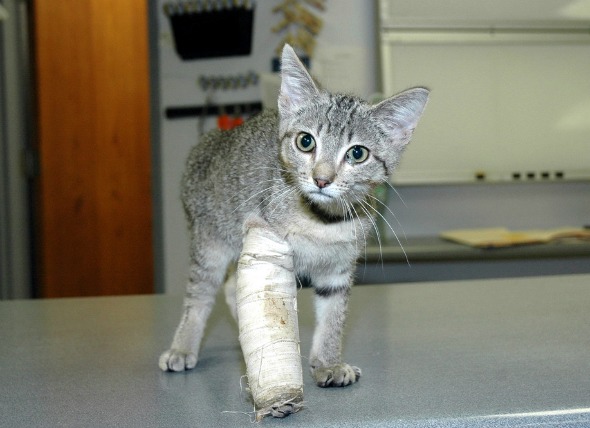
The causative agent of sarcocystosis (Sarcocystis) is the same organism that causes equine protozoal meningitis. Cats that live around horses and other herbivores (cattle, swine, etc.) may serve as a reservoir for infection for these animals. Symptoms in infected cats are rare however.
Sarcocystosis can occur in both dogs and cats. If you would like to learn how this type of infection affects dogs, please visit this page in the petMD health library.
Symptoms in cats are rarely seen but may include:
A cat may be infected by eating raw meat contaminated with Sarcocystis organisms.
Occasionally, Sarcocystis organisms can be seen in the feces on microscopic fecal examination. However, in most instances, diagnosis is accomplished by finding the organism on histopathology in tissues such as the lungs, liver, kidney, spleen, brain and/or muscle.
More specialized testing such as immunohistochemistry and PCR may be available at some research facilities but are not widely available outside of a research setting.
No definitive treatment for sarcocystosis exists. Treatments such as clindamycin or sulfadiazine may be tried if sarcocystosis is suspected or diagnosed.
Do not allow your cat to eat raw or uncooked meat.
 Anemia, Nonregenerative in Cats
Nonregenerative Anemia in Cats
A decrease in red
Anemia, Nonregenerative in Cats
Nonregenerative Anemia in Cats
A decrease in red
 Brain Injury in Cats
There are a variety of things that can cause brai
Brain Injury in Cats
There are a variety of things that can cause brai
 Front Leg Injury in Cats
Brachial Plexus Avulsion in Cats
Cats can experie
Front Leg Injury in Cats
Brachial Plexus Avulsion in Cats
Cats can experie
 Skin Mite Dermatitis in Cats
Cheyletiellosis in Cats
An infestation of the Che
Skin Mite Dermatitis in Cats
Cheyletiellosis in Cats
An infestation of the Che
 How to Stop a New Cat From Being Aggressive to Other Cats In the Home
How to Stop a New Cat From Being Aggressive to
How to Stop a New Cat From Being Aggressive to Other Cats In the Home
How to Stop a New Cat From Being Aggressive to
Copyright © 2005-2016 Pet Information All Rights Reserved
Contact us: www162date@outlook.com